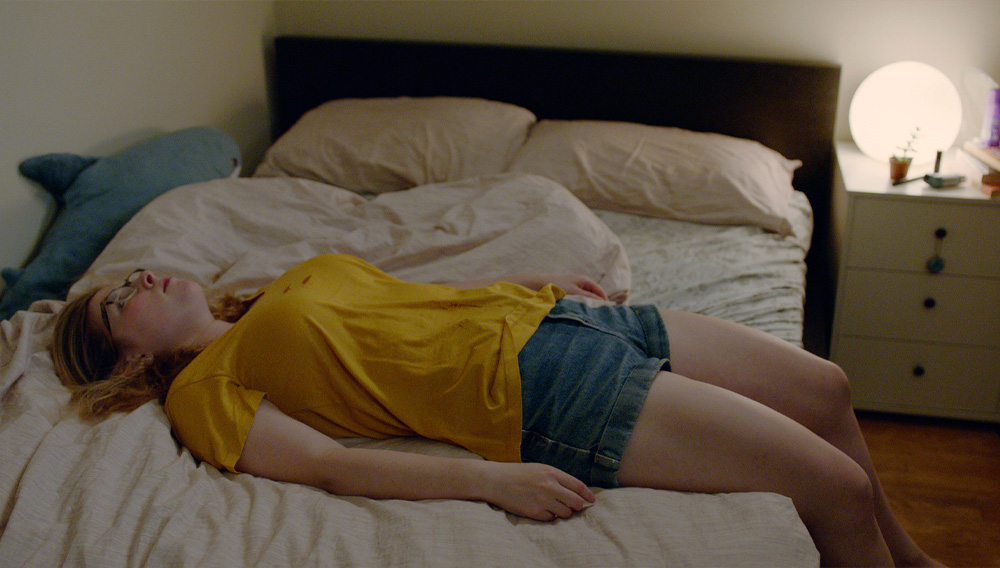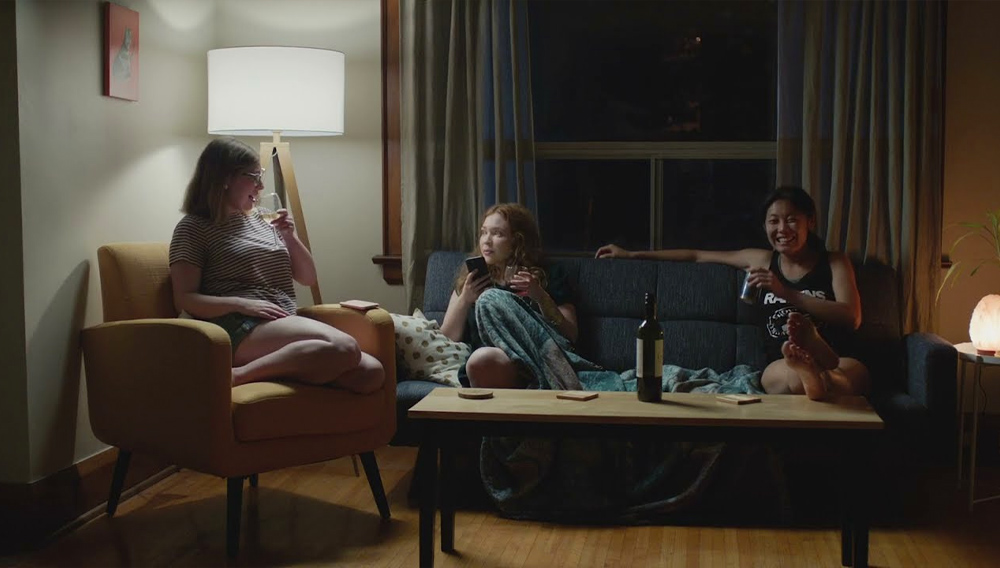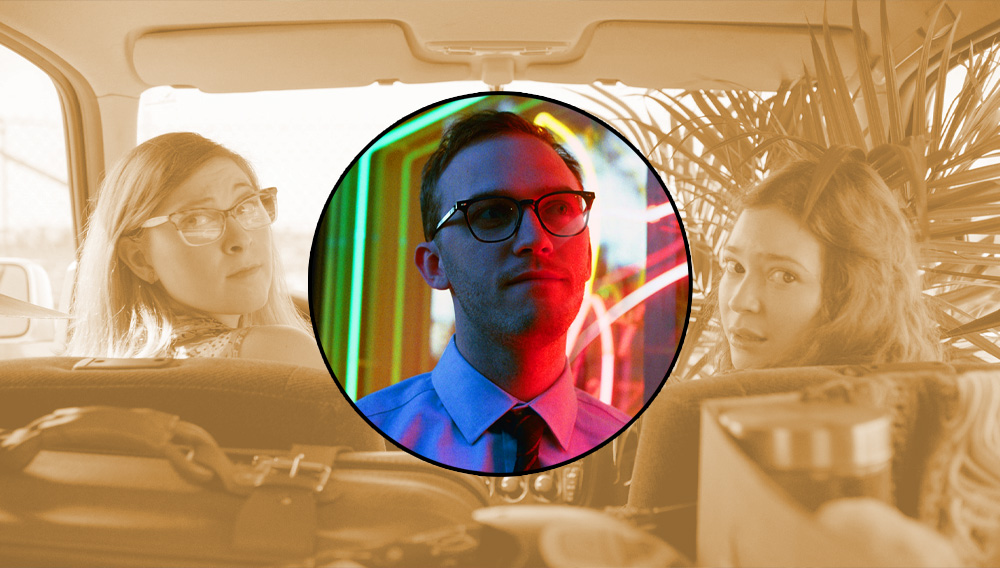An everyday traffic stop escalates into a head-spinning crisis in the Canadian comedy Retrograde, now streaming exclusively on Fandor. Twentysomething Molly (Molly Reisman) gets pulled over while helping her new housemate move, and despite putting up the argument that it was all the cop’s fault, she drives away with a $300 ticket. Molly goes festering nuts, consumed by her obsession to beat the fine in ways that ripple outward and compromise all her relationships—from her long-suffering boss and co-workers to her housemates, especially Molly’s at-the-time passenger Gabrielle (Sofia Banzhaf), whose astrology readings work at her nerves.
As she relentlessly works her way through Toronto’s traffic court system, Molly rejects lots of good advice and generally makes everyone around her feel tense and/or awkward in her presence. Writer-director Adrian Murray doubles down in a parallel way in the film’s sharp, concise 74 minutes, sticking like glue to a wispy premise that—in Reisman’s deft, nuanced performance—serves up a motherlode of incidental human comedy: the minutiae of everyday humiliations, exaggerations, terrible instincts, misguided ego, delusions and overthinking that make human existence in Western industrialized society the thrill ride it is.
Keyframe spoke with Murray recently by Zoom, as he discussed his very personal relationship to the story, the Slamdance-vetted film’s unpredictable admixture of inspirations, and Toronto’s close-knit indie film scene.

KEYFRAME: I identified with Molly’s obsessiveness. I got a speeding ticket one time, but I insisted it happened on a steep hill and there was a loophole about the percentage of the incline that could invalidate the ticket. I went down to the Atlanta city planning office and started pulling out maps. It got a little extra. Was the germ of the film something like that, or more landing on a universal situation that could bloom in a world-destroying fixation?
ADRIAN MURRAY: It is world destroying, but the real-life event for me that inspired it was on the astrology side. It was at a party, and someone was doing a reading off their phone for me. I didn’t like it or agree with it, but everyone else thought it sounded just like me. Like, you’re not the person you think you are and trying to get control of that. The traffic [plot] was another thing to be obsessive over. I thought the two interacted in an interesting way to talk about control, truth and perception.
Molly the character is compelling because Molly the actress embodies her so thoroughly. Her personal dynamic with other people is the cringe that keeps on giving. How did you two meet?
I worked with her in undergrad on the first-ever feature that my friend was directing and I was co-writing. Then we became housemates when she moved back to Toronto. She had a smaller role in my first feature (2017’s Withdrawn). It’s funny, I’m realizing now that I’ve never made a movie that didn’t involve my housemates. This time, I’m married to the production designer [who is also] one of the producers. They’re always very close to home for me. Making stuff with your friends is a real treat and its own reward. Then people get to see it, which is also fun.
As roomies, did Molly yell at you about the dishes?
No, she was a very good housemate. I was living with her and two other friends at the time. Molly is not like the character Molly. I knew that she could be intense onscreen, but that she also was likable. So, we could progress from that to someone who gets very grating.
How did you and Molly construct the character?
We didn’t work on the script together as writing partners, but we did have chats about it. The main question was “Is she lying or not?” We had to settle on a truth for the whole movie so that she could play it straight. We went over the incident that you don’t see in great detail so that she knew exactly what she was talking about.
There is a real art to capturing the incremental banality of day-to-day life as it turns into this crushing mountain of embarrassing awfulness.
It’s like Larry David via Jeanne Dielman. [Laughs.] We’d run it through once or twice, but the rehearsal was built into the shooting process. The scenes play out in one long take for the most part. We had the time to do 20 takes. You’re working fresh from the rehearsal and change things as you go. If you stumble on a line twice, that probably means it should be changed. If we get tired of the direction the scene was going and want to try something different, we can.

It feels brave to base an entire film on this premise, and then follow it all the way through. I admire that commitment to the riff.
The low stakes.
But high stakes for her.
Well, that’s just it. Curb Your Enthusiasm is a big influence. Most of the time the stuff is low stakes, but you get to see either how it becomes larger stakes or why it’s big for him. I wanted to hone in on how big of stakes these were intellectually for Molly. She’s having these realizations that she has no control and trying to figure out a way to get it. At most, she’ll lose her license. It was like a process of over-intellectualizing the issue, which I do all the time. I got a speeding ticket when I was 22. I’ve been fighting it for 10 years just in my head.
Toronto obviously has a strong film community. Do you find it a functional environment for making movies?
There’s a lot of people working in the same financial bracket. We’re all going for the same grants, telephone funding, that Arts Council funding. I was fortunate to have friends who got that and helped me with the application process. Shout-out to Lena Rodriguez.
You know, there are other filmmakers in the film. I met Eric Anderson, who plays the lawyer, because I watched his three-and-a-half-hour epic about a filmmaker making their thesis film, which is a lot more interesting about that premise. The character of Caleb is played by Meelad Moaphi, who is starting production on his first feature now. It’s a supportive community but also small. You tend to see each other at screenings and wave to each other.
Were there important lessons you took with you from earlier stages of your development as a filmmaker?
Yeah, totally. I mean this with all due respect to the people I went to film school with, but… part of my filmmaking comes from seeing a lot of student films and trying to do the opposite of what makes it feel like a student film. On the other side, I got to meet people who I’m still working with. I had some great teachers. Having people push you and give you deadlines is very helpful. You start working the muscles. I wouldn’t say all my student films were good, but you have to exercise your worst impulses and see them in order to pass them.
Beyond Larry David, who are your other inspirations?
My first film was similar in terms of comedy and visual style. My friends recommended I watch Jeanne Dielman. It’s a heavy movie, but it also isn’t devoid of comedy. I really like the way you find your own jokes. When you’re not underlining where you’re supposed to laugh, you make your own inside jokes with the movie. You get to explore different situations with this type of intimate comedy.
[Corneliu Porumbolu’s 2009 deadpan comedy about Romanian legal bureaucracy] Police, Adjective was a big influence for this one. It’s a very funny movie but never tells you to laugh. I hate being told what to do.




